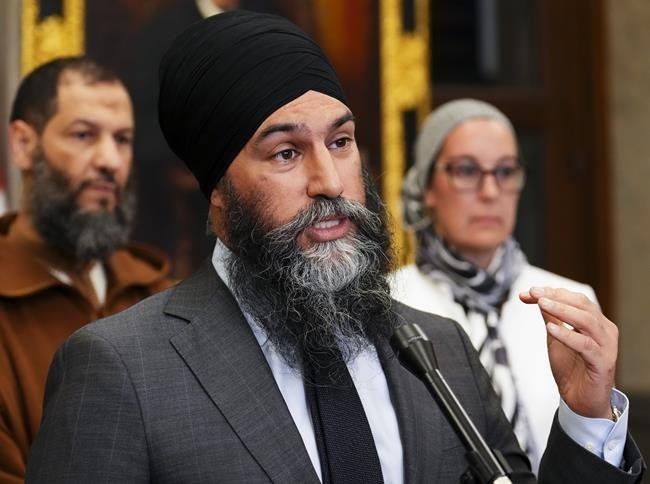OTTAWA — Federal NDP Leader Jagmeet Singh says Pierre Poilievre's criticisms of the CBC amount to an attack on Canadian culture by the Conservative leader — and Quebec and francophone culture, in particular.
Singh addressed the issue, speaking in French, after Twitter added a label to CBC's main account on Sunday indicating the broadcaster was "government-funded media."
That move prompted the corporation to announce Monday it was hitting pause on its use of the social-media platform, which described the BBC the same way before changing its own label to "publicly funded media."
CBC receives roughly $1 billion in taxpayer money annually, but it contends the label is inaccurate because it maintains editorial independence and receives its funding through a vote in Parliament.
Poilievre regularly promises to slash that funding. And he sent a letter to Twitter last week requesting that the label be applied to accounts associated with CBC News, though the letter did not mention Radio-Canada, the French-language wing of the broadcaster.
The Conservative leader has suggested in media interviews that while he believes in defunding the CBC, he sees the value in its French-language programming and the need to serve francophone communities — but both the NDP and Bloc Québécois are raising specific concerns about that approach.
"This is not just an attack against independent journalists," Singh told reporters Monday, speaking in French. "But it is also an attack against Canadian culture, particularly Quebec culture and francophone culture."
An attack on the broadcaster "will hit the francophone community across the country that depends on Radio-Canada for the news, to share stories, to share culture," he said.
"It shows someone who is willing to attack Quebec culture."
Poilievre's office has not responded to a request for comment.
Earlier in the day, Bloc Québécois Leader Yves-François Blanchet said on Twitter that Poilievre is playing a risky ideological game, and that he's openly threatening French and access to information and the arts.
Pierre Paul-Hus, one of two Conservative MPs that Poilievre tapped to serve on his House of Commons leadership team, responded on the platform to say the Bloc leader's assertion of looming cuts was false.
The federal Conservatives currently hold nine out of 78 federal seats in Quebec, while the governing Liberals boast 34 and another 32 belong to the Bloc. The NDP has one seat and Alain Rayes, a former Conservative who left the party last fall after Poilievre won its leadership contest, sits as an independent.
Poilievre, a fluent French speaker, has visited Quebec several times since becoming Conservative leader.
Making gains in the seat-rich province has proved challenging for the federal party, whose support is heavily concentrated in Western Canada. Since the 2006 federal election that elected Stephen Harper, the Tories' best showing in the province was to hold a dozen seats.
Alexandre Boulerice, the federal NDP's sole MP in Quebec, told reporters on Monday that Poilievre is "at war with CBC," which he defended as an independent organization.
Asked about Poilievre's pitch to maintain funding for its French-language services, Boulerice suggested that Conservatives were weighing their electoral chances in Quebec, a majority French-speaking province.
"Maybe that's the calculation because otherwise, (it) makes no sense, this false distinction."
CBC has clarified that any proposal to axe its funding while maintaining its French-language programming would require a change to the Broadcast Act, the legislation that stipulates its mandate.
Spokesman Leon Mar said in a statement last week that to fund Radio-Canada and not CBC "would change the very nature of how programs and services are funded in Canada to target public money at only one language group."
Mar's statement pointed out that federal law says the broadcaster must provide services in both official languages.
The law also outlines that the corporation is to be independent. As it stands, funding decisions about where to allocate the taxpayer money it receives annually are handled by a board of directors, with no input from the government or Parliament.
Prime Minister Justin Trudeau and Heritage Minister Pablo Rodriguez both slammed Poilievre's comments toward the CBC and accused him of looking to U.S. billionaires to wage his attacks, referring to Twitter CEO Elon Musk.
This report by The Canadian Press was first published April 17, 2023.
Stephanie Taylor, The Canadian Press



